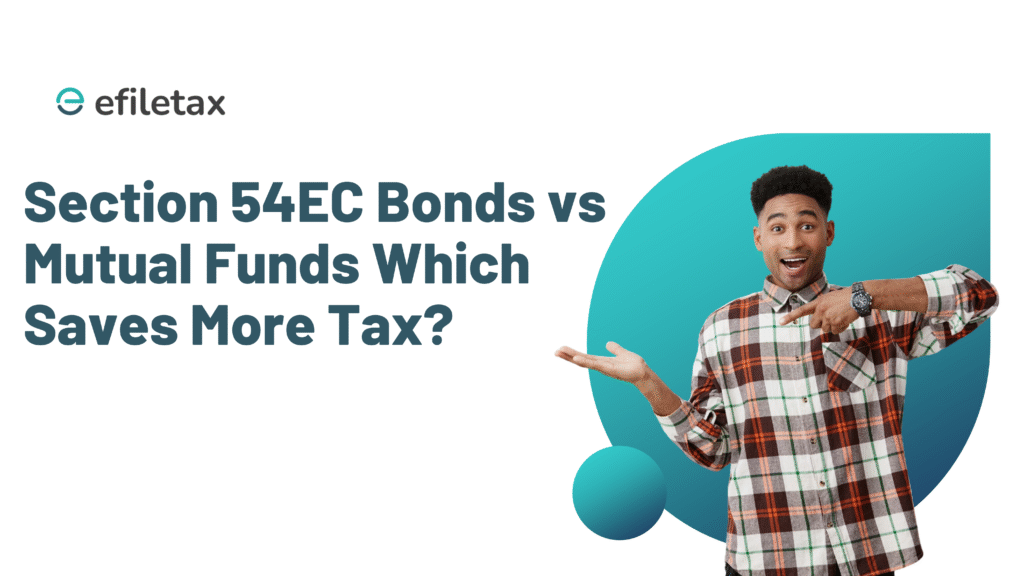
Section 54EC Bonds vs Mutual Funds: Which is Better to Save Capital Gains Tax?
When you sell a property and earn long-term capital gains, Section 54EC bonds are one of the safest ways to save tax. But with just 5.25% taxable returns and a 5-year lock-in, are they worth it? Or should you consider mutual funds that could give over 8% CAGR?
Let’s break it down.
What are Section 54EC Bonds?
Section 54EC of the Income Tax Act, 1961 allows individuals and HUFs to invest long-term capital gains (from sale of land/building) into notified bonds and get full tax exemption, provided:
- Investment is made within 6 months of sale
- Investment is limited to ₹50 lakh per financial year
- Lock-in period is 5 years
- Bonds are issued by REC, PFC, IRFC, NHAI (all govt-backed)
- Interest rate: 5.25% p.a. (taxable)
Legal Source: Section 54EC of the Income-tax Act, CBDT Notification S.O. No. 2426(E) dated 08.07.2023
Why Do People Prefer 54EC Bonds?
- Zero tax on capital gains (if held for 5 years)
- No market risk – capital is protected
- Issued by government entities – safe and credible
- Simple to invest – can be done through demat or physical forms
But… What’s the Catch?
- Returns are fully taxable under “Income from Other Sources”
- 5-year lock-in – no premature exit or liquidity
- Interest of 5.25% barely beats inflation
- Better post-tax returns may be possible elsewhere
Mutual Funds vs 54EC Bonds – A Quick Comparison
| Feature | 54EC Bonds | Mutual Funds (Debt/Hybrid/Equity) |
|---|---|---|
| Tax Saving on Capital Gain | Yes (up to ₹50 lakh) | No direct exemption |
| Return Rate | 5.25% p.a. (taxable) | 8–12% CAGR (varies by fund) |
| Liquidity | Locked for 5 years | Open-ended funds – flexible exit |
| Tax on Gains | Interest fully taxable | LTCG taxed at 10%/20% post index. |
| Market Risk | Nil | Moderate to High (depending on type) |
| Goal Fit | Safe tax-saving | Long-term wealth creation |
Real World View: Is Mutual Fund a Smarter Option?
Let’s say you make ₹50 lakh long-term capital gain.
Option A – 54EC Bonds
- Invest ₹50 lakh
- Annual interest: ₹2.625 lakh (taxable)
- Post-tax return over 5 years: ~₹59 lakh (approx.)
Option B – Mutual Funds (Avg 9% CAGR)
- Pay LTCG tax: ₹10 lakh (approx., 20% of ₹50L)
- Invest remaining ₹40 lakh
- Grows to ~₹61.5 lakh in 5 years (even after tax)
Net Gain: Mutual funds can beat 54EC bonds if you can handle market risks and forgo tax exemption.
Expert Tip from Efiletax
“54EC is great if you’re risk-averse and just want to save tax. But if you’re okay with some volatility and can stay invested, mutual funds offer superior wealth creation potential — even post-tax.”
When Should You Choose 54EC Bonds?
- If you’re nearing retirement and don’t want market exposure
- If you plan to use capital after 5 years
- If you want assured capital protection, not growth
When Mutual Funds May Work Better?
- If your goal is long-term wealth creation
- If you’re in a lower tax bracket
- If you already used the ₹50 lakh 54EC limit and want better post-tax returns
Closing Thoughts
Section 54EC bonds are safe, but slow. Mutual funds are risky, but can give better returns — even after paying capital gains tax.
Want help choosing the right route for your property gains?
File smart. Invest smarter. Talk to Efiletax today →
FAQ: Section 54EC Bonds vs Mutual Funds
Q1: Can I invest in both 54EC bonds and mutual funds?
Yes. You can use ₹50L in 54EC bonds and the remaining gain in MFs.
Q2: Are 54EC bonds risk-free?
They’re government-backed, so default risk is negligible. But they carry interest rate and reinvestment risk.
Q3: Can I break 54EC bonds before 5 years?
No. Premature redemption is not allowed.
Q4: Is mutual fund investment eligible for any capital gains exemption?
Not directly. You must pay capital gains tax, but reinvested amounts can still yield better long-term returns.
Summary
Section 54EC bonds offer tax exemption on capital gains but low taxable returns. Mutual funds, despite tax liability, may outperform with better post-tax growth. Compare lock-in, risk, and returns to make the right choice. Understand the trade-off before you invest your sale proceeds from property.